2019年10月4日に北海道大学理学部大講堂で「令和を切り拓く君へ(対話型セミナー・日本オラクル編)」と題して行われた、企業の方と博士課程学生との対話型セミナーの講演内容をダイジェストでお届けします。
Date: Friday, October 4, 14:45-16:15
Venue: School of Science of Science Auditorium No. 5 Building 203
Organized by: Hokkaido University Ambitious Leader's Program Fostering Future Leaders to Open New Frontiers in Materials Science, Hokkaido University University Faculty of Science
Co-organizer: Oracle Corporation Japan
Guest (Oracle Corporation Japan) titles omitted
Hisayuki Ishizumi Executive Vice President
Masatoshi
Komori│General Manager of Technology Consulting Director
Yusuke
Takeyoshi│Cloud Technology Consulting Division
Keith Ray Grogg│Consulting Services Division
Takashi
Hitomi│Public Solutions Department Director
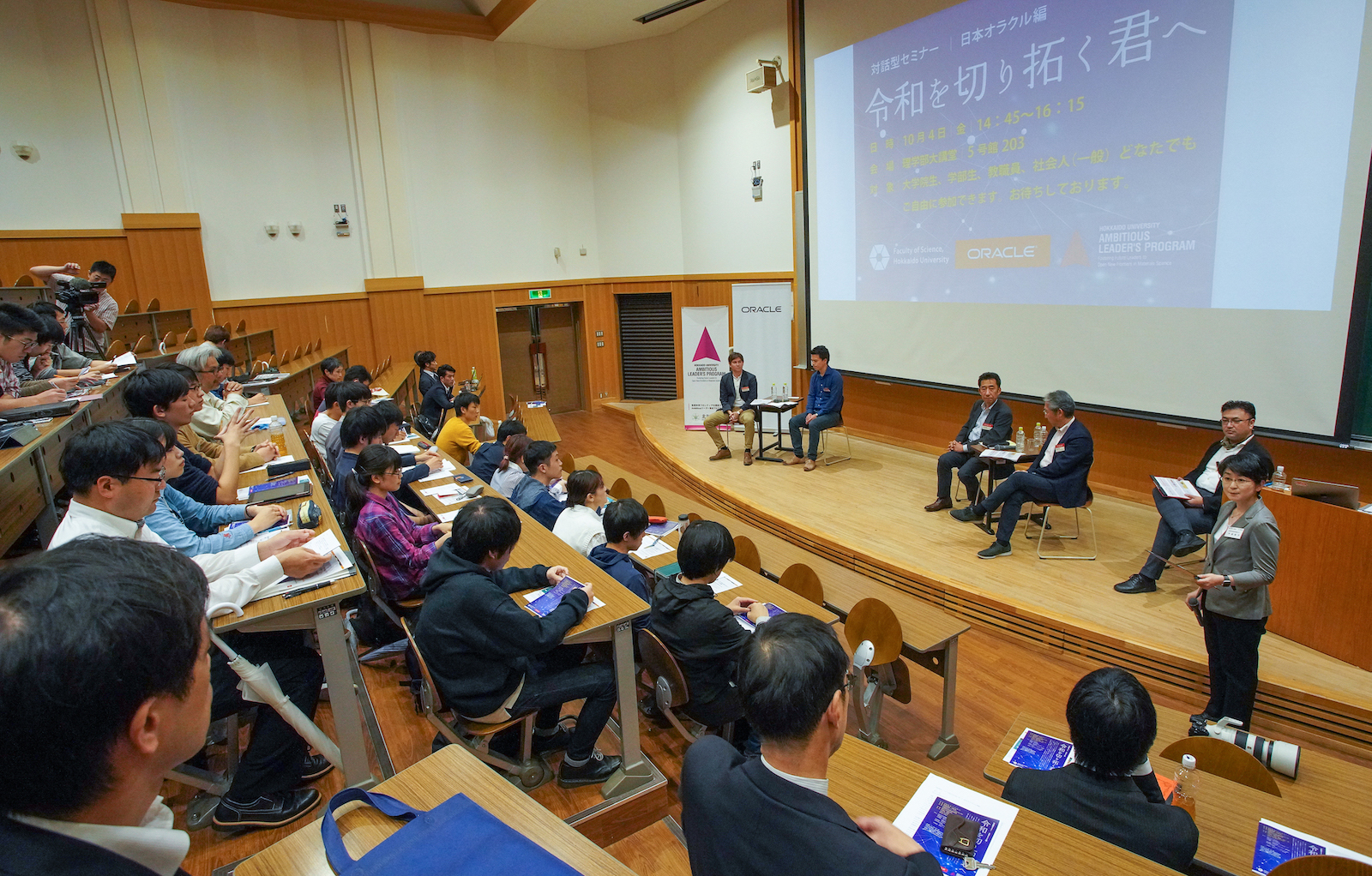
グローバル企業オラクルと博士人材の活躍
First, Mr. Ishizumi, vice president of the company, explained about Oracle Japan and talked about the status of doctoral human resources.
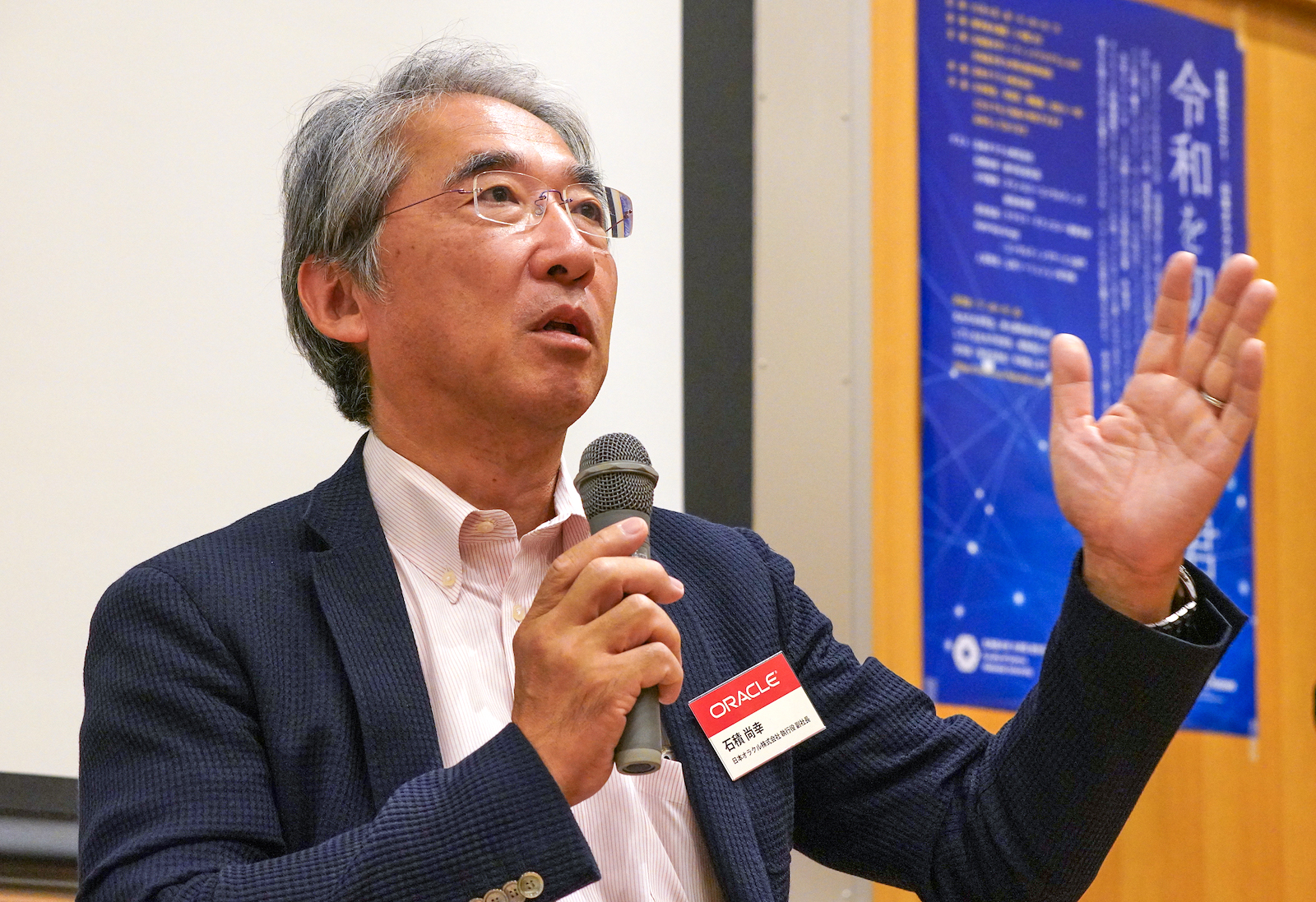
It is masonry. Oracle is an enterprise software company and does not offer products to the general public like Microsoft does. Among the companies we serve, there are Google, Apple, Facebook, and Amazon, which are called GAFA, and occupy the top sales.
Oracle's company size is almost the same as Toyota Motor Corporation, and it is roughly in the 46th and 47th places in the world. Established in 1977, it can be said to be a long-established IT company. We have 130,000 employees, but what I would like you to pay particular attention to is that among the 130,000 employees, there are a very large number of developers, 38,000, which accounts for 30% of all employees. In this way, Oracle is a company where many employees are involved in development. Among the developers, there are many who have obtained doctoral degrees, just like you.
Oracle's headquarters are in the United States, but development bases are scattered around the world, and there are developers in Japan as well. His boss is in the United States, India, and China, doing development work using networks.
One of my subordinates graduated from university, joined Oracle, quit his company once to get a doctorate, went to England to study, returned to Japan, reentered the University of Tokyo, and obtained his doctorate there. I'm back to Oracle. Then, I said that I wanted to be more active in Asia, so I transferred to Thailand, where I support Asia, including Japan. Please think of us as a technology company that is active on the world stage.
IT企業とは?ITとは?ポートフォリオの変遷
Mr. Komori, General Manager of Technology Consulting Director, talked about the importance of each person finding their own role as the business of the company changes along with the rapid changes in society.
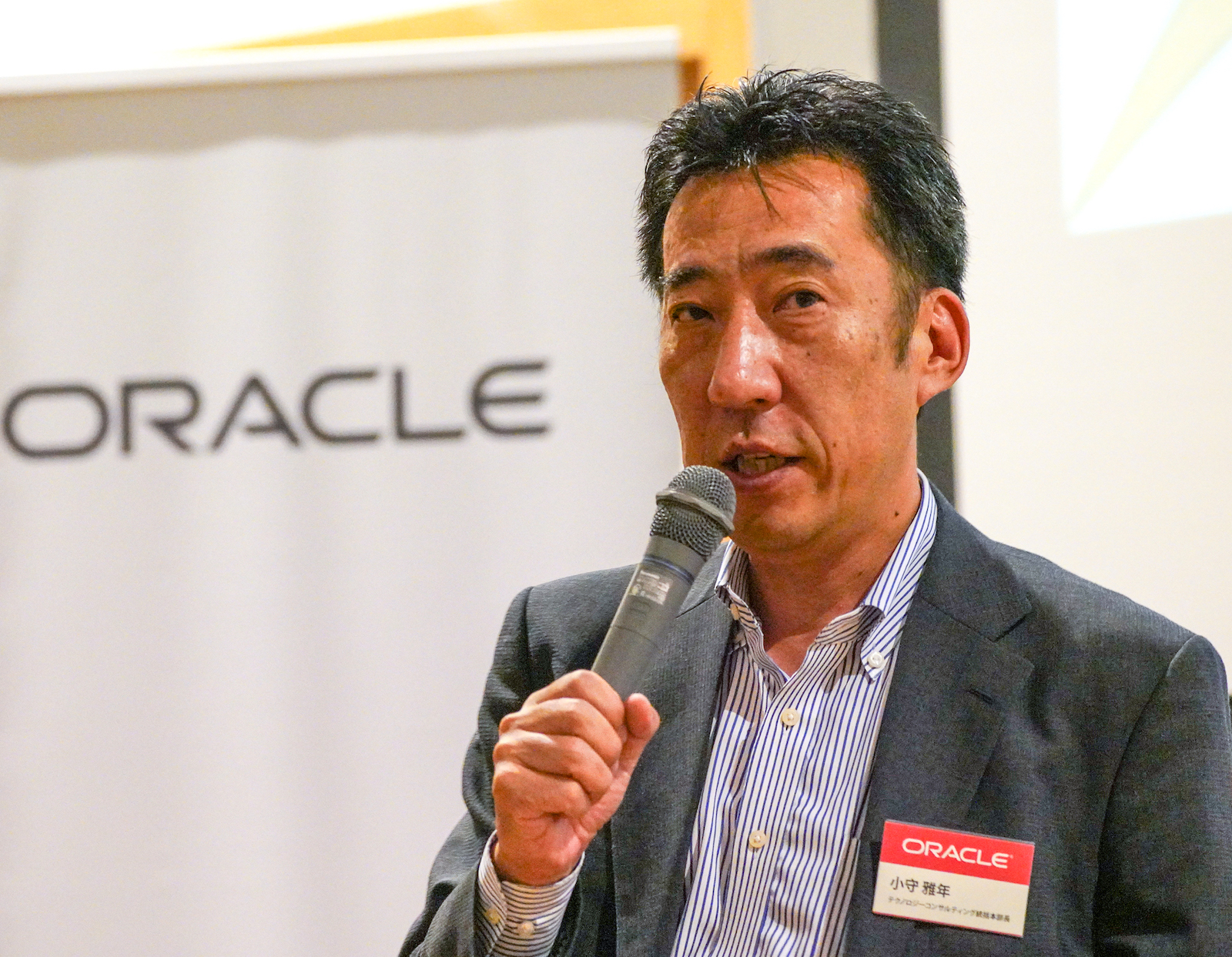 小守です。この20年間、オラクルは多様に変化してきました。創業者であるラリー・エリソンは、「1番」が大好きです。全てのプロダクトの分野で1番になれということで、ERPと言われる企業システムのバックオフィスのシステムとデータベースの製品で1番を取ろうとしました。そして、次にソフトウェア、ハードウェアをコンパイルして提供しようということを考えました。これが10年前のことです。
小守です。この20年間、オラクルは多様に変化してきました。創業者であるラリー・エリソンは、「1番」が大好きです。全てのプロダクトの分野で1番になれということで、ERPと言われる企業システムのバックオフィスのシステムとデータベースの製品で1番を取ろうとしました。そして、次にソフトウェア、ハードウェアをコンパイルして提供しようということを考えました。これが10年前のことです。
With the advent of the cloud era in the last 10 years, there is no longer a need to buy hardware. In just 20 years, the product has changed rapidly. If you were to compare this change, your research will be on the market next year, and once it is on the market, it will be imitated, so you must always think about the following. We are moving at such speed.
When I joined Oracle, it was around 2000, and it was a unit of 100 people to do any project. It was considered cool to gather 1,000 people in one night. It was considered cool to gather 1,000 people in one night. In 2010, there will be a compilation of the software and hardware I mentioned earlier. As a result, the size of the project became smaller, and it became important for us to ensure QCD, that is, quality, cost, and delivery, when providing products. Instead of knowing only about the product, I learned more about the customer's project and changed my job to meet the problem exactly.
Since it is a global company, even if it is nighttime in Japan, the United States will move, and the United Kingdom will move. Problems of how to share the world's information and how to adopt each other's communication style will appear. Eventually, even though we were providing both hardware and software, when we started providing the cloud, we were asked what exactly Oracle wanted to sell. Then we sort of sort the work for a while. The type of work has changed so much in 20 years. What is needed now is a “consultant who is resistant to change”.
Next, Mr. Takeyoshi and Mr. Keith talked about their own work and career path experiences.
社会実装の難しさに直面して
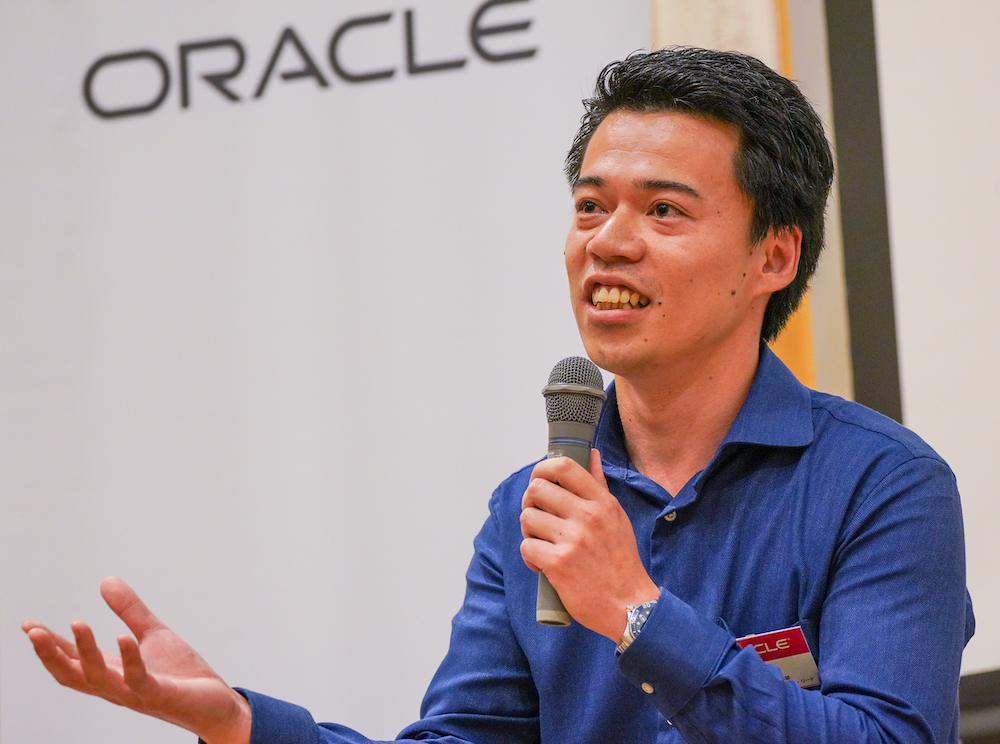 This is takeyoshi in charge of the con. I will introduce the specific consulting process. Recently, an increasing number of people are conducting research aimed at synergizing informatics and science and technology research areas to make possible what was not possible before. For example, in the world of materials science, there is the problem of how to make materials that are hard, light, and cheap. Rather than actually experimenting and testing and looking at the characteristics and performance, when you want something with this kind of background and performance substance, how to make it, how to solve this kind of inverse problem This is often the problem. Recently, attention has been paid to the trend of using the power of IT to speed up such areas and improve accuracy. In fact, I myself provide Oracle's services to research institutions.
This is takeyoshi in charge of the con. I will introduce the specific consulting process. Recently, an increasing number of people are conducting research aimed at synergizing informatics and science and technology research areas to make possible what was not possible before. For example, in the world of materials science, there is the problem of how to make materials that are hard, light, and cheap. Rather than actually experimenting and testing and looking at the characteristics and performance, when you want something with this kind of background and performance substance, how to make it, how to solve this kind of inverse problem This is often the problem. Recently, attention has been paid to the trend of using the power of IT to speed up such areas and improve accuracy. In fact, I myself provide Oracle's services to research institutions.
Now, I am doing informatics-related work, that is, data analysis, but at first I could only see a narrow area. For example, when I wanted to try something new, I repeatedly learned IT skills, statistics, graphs, machine learning algorithms, and so on. Of course, we have to make use of this in consulting to provide services, so we have made a proposal to a customer as a service. However, the customer's reaction ended with only "It looks amazing, it looks interesting".
I wondered why my proposal was not adopted, and thought that I had not studied enough, so I studied further for a year, but in the end it was not adopted as a business. I felt the difficulty of social implementation, and of course my boss, Mr. Komori, got angry at me, and I was keenly aware that I could not implement it in society just by improving my own skills.
So, I thought about how to overcome the difficulty of social implementation. A data analysis project is roughly divided into three roles. The same is true for research. A data analysis project can only start when all three roles are in place: someone with knowledge of the so-called domain, someone who understands statistical theory, and an engineer who can implement it.
Oracle's consultants tend to be engineers, but I realized that both theory and business are necessary. I also have a background in science, so I'm more interested in engineering than theory. I learned No matter how advanced the theory or algorithm you know, even if you can create it, it is meaningless unless you can meet the demands of customers and society. Now I'm studying to expand my business and other fields.
Lastly, I would like to leave a message for graduate students. I would like to share with you my expectations for those in the sciences and those with experience in research. Going beyond what you are interested in, I would like you to keep in mind how you want to make use of it in the future, the fusion of knowledge between domains, and synergies, and continue your research in the future. And it is the ability to create ideas without presuppositions. From now on, I think that creating something from 0 to 1 will become a truly important world, so I would like to work with people who are accustomed to such things.
思い切って他分野に飛び込んで専門性を活かす
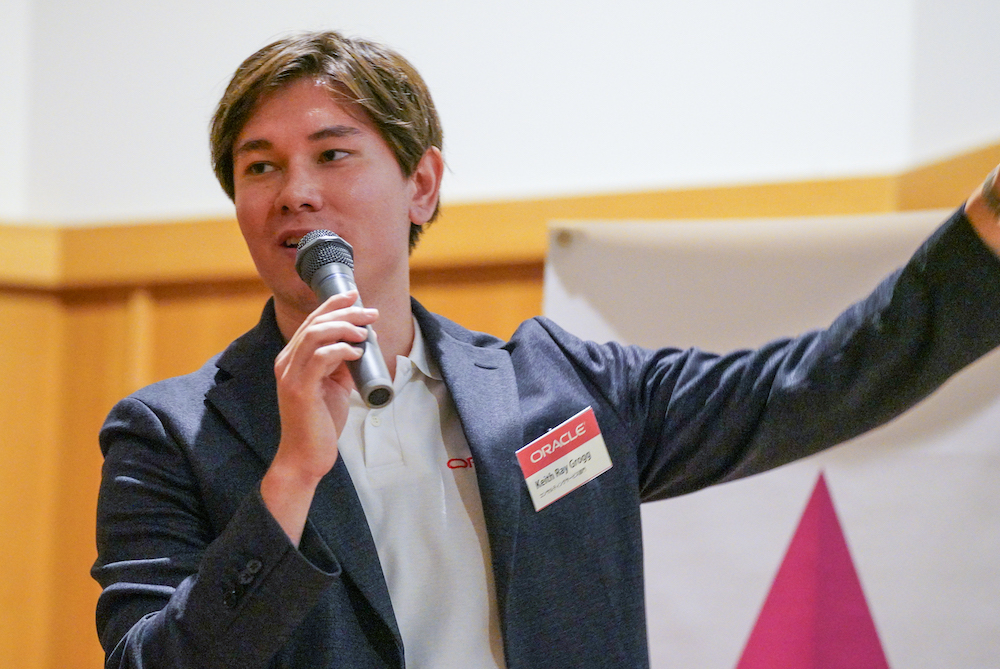 This is Keith in charge of consulting. . I work in machine learning and networks. I participated in an internship at Oracle during the summer vacation when I was enrolled at university, and learned about the world of the IT industry and how data is handled, and became interested.
This is Keith in charge of consulting. . I work in machine learning and networks. I participated in an internship at Oracle during the summer vacation when I was enrolled at university, and learned about the world of the IT industry and how data is handled, and became interested.
Looking at various jobs, I was worried about what kind of field I should work in. I studied mechanical engineering because I liked making things and admired Tesla and SpaceX. It would be nice to continue in the field of mechanical engineering, and it would be interesting to move on to a completely different business, but I was worried that I would be able to throw away what I had learned in mechanical engineering.
However, I was very interested in IT, so after graduating I joined an organization called Oracle Digital Japan. I entered a sales position and thought that this was the end of my skills. After that, I had the opportunity to move to the consulting services department, and thought that I could use what I had studied in mechanical engineering. I never imagined that I would be able to make the most of my experience and that I could enter an IT company and supply what I had learned in mechanical engineering. I was surprised to hear the word "materials engineering" again after entering the same department as Mr. Takeyoshi.
From now on, IT will spread to various fields of science, and the issue is how to handle data in the future. When I was in college, I thought that engineers were the only ones doing mechanical engineering, which I had studied, but I realized that I could make use of it in other industries that I had never thought of. People from various fields can work together because they have common points such as data and IT. So if you look for ways to make the most of your career so far, I think your career path will expand.
This video summarizes the preparations and impressions of the ALP (*) students who participated in the planning of this event.
*ALP: Hokkaido University Ambitious Leader's Program Fostering Future Leaders to Open New Frontiers in Materials Science
